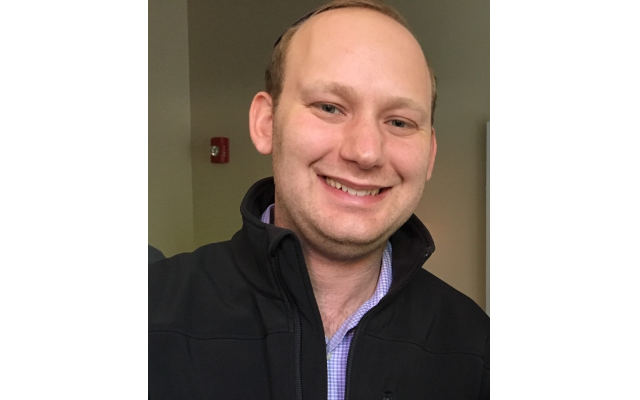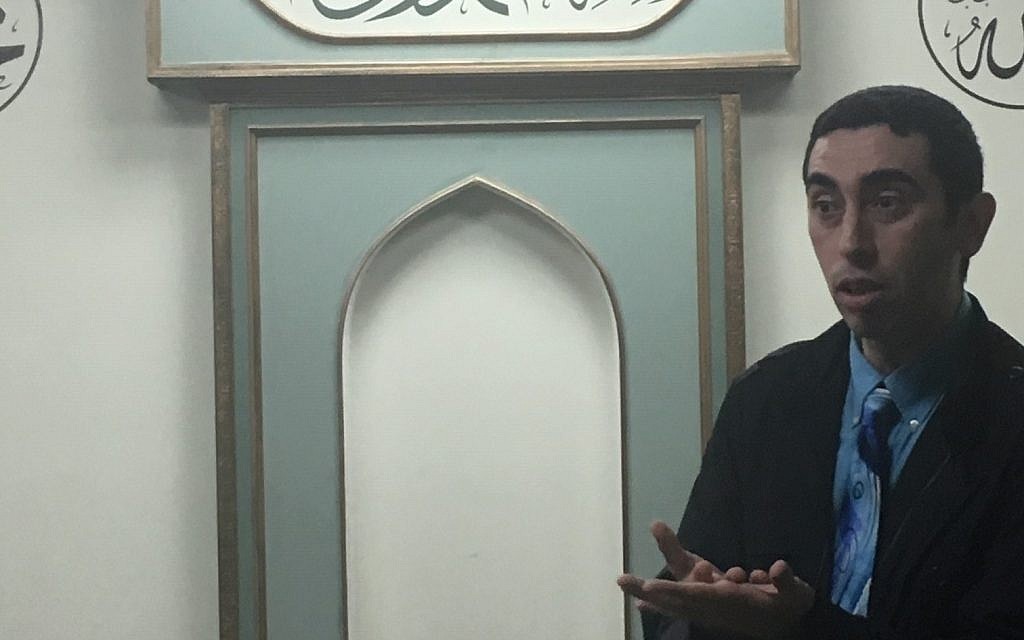Turkish Islamic Center Opens Mosque to Marietta Jews
About 40 members of Congregation Etz Chaim visited the Southeast Islamic Community Center on Nov. 11.

From the outside, nothing stands out about the buildings of this typical Alpharetta office park. Only a small plaque on one of the buildings furthest from the street reveals that this is the Southeast Islamic Community Center, which includes a mosque, and another paper sign on the door alerts visitors: “Don’t Step with Shoes.”
And there’s good reason for the discreetness. Like Jews, Turkish Muslims try not to draw attention to themselves, Kemal Budak told about 40 members of Congregation Etz Chaim invited to visit the cultural center and mosque Nov. 11.
Before the Pittsburgh synagogue shooting last month, Muslims believed they were the main target of hatred in America, he said. They were fearful of the backlash following the 9/11 terrorist attack in New York.
“I thought there was no anti-Semitism, that Muslims were the only minority in trouble in the United States.” The invitation for the synagogue to visit the Islamic center came far in advance of the Pittsburgh shooting.
On. Nov. 3, Budak was among the interfaith leaders who came to Shabbat services at Etz Chaim and stood on the bimah in a show of unity.

“Islamophobia and anti-Semitism are very similar,” Budak told the Jewish visitors Nov. 11. He is an Emory University sociology student who also teaches a class in religion and immigration. He also participates in many interfaith dialogue activities in Atlanta, including Thanksgiving with a Catholic church, he said.
Budak spoke to the Jewish guests about oppression in Turkey that sounded familiar to Nazi tactics before World War II, when scholars were rounded up, along with anyone who didn’t support the government, and lost their jobs and property.
“In Turkey, they can’t find enough doctors, scholars and university professors. If you are fired from a job, you are lucky. If you are unlucky, you go to jail,” Budak said. “If they can’t find the guy they are looking for, they take their wife or mother … teenage son or daughter.”
Many in Turkey wouldn’t come to the same cultural center in which the Jewish guests gathered because of fear of reprisal from the government.
Jews are also persecuted in his former country, he said. “Anti-Semitism in Turkey is pumped by everyone.” This includes millennials, who hate all western countries and think they are “dragging Turkey down.”
The Turkish government, which he compared to a military dictatorship, tries to rid the country of minorities, including Greeks and Jews, who have to hide their identities if they stay there. Signs of religion in public places are prohibited.
Almost half of Turkish Americans who came to Atlanta in the last two years escaped oppression in Turkey, he said. They are generally more religious, middle class, and believe in non-violent Islam.
Budak, who moved to Atlanta 11 years ago, believes there are between 100 to 150 families in North Atlanta, about 400 to 500 families in Atlanta. So about 2,000 to 3,000 people total.
He encourages Muslims to fully integrate into American society and speak English, but many of the new arrivals stick to themselves because of what they experienced in Turkey, he said. “They are scared. Some of them lost everything in Turkey.”
Fear of discrimination or scapegoating isn’t the only similarity between Jews and Muslims, the Etz Chaim group learned during its mosque tour.
Like Jews, Muslims deal with the December dilemma, ensuring their children enjoy their own holiday traditions so they aren’t jealous of their Christian peers celebrating Christmas.
As the Jewish visitors removed their shoes to enter the richly carpeted mosque, they saw a sadaqa (similar to the Hebrew, tzedakah) box for donations.
A wooden paravan, or divider, is used to separate women from men during prayer, to avoid distraction and protect the privacy of the women, Budak explained.
Budak said that Muslims look for the kosher symbol on food to know what to eat because it’s easier to find than a halal marking. They are taught: “You can eat whatever the people of the book slaughter.”
Muslims also don’t eat pork or shellfish, he said. The buzz of the Jewish crowd escalated with excitement every time they heard something in common.
“I’ve been here two years in January and what I buy in the grocery store is Us and Ds and Ks,” said Fusun Atesmen, a volunteer member of the Turkish center’s interfaith dialogue group.
Another revelation was that the prophet Moses is mentioned in the Quran more than any other prophet – 136 times – compared to 25 times for Jesus and four times for Muhammad. Calligraphy around the mosque pays tribute to the first four caliphs and the prophets.
Atesmen, covered from head to bare feet in traditional Muslim hijab, read in her native language – followed by English – a prayer from Moses about making his speech understood.
Budak also pointed to calligraphy that emphasized the monotheistic nature of the religion: “There is no god but God,” to which some of the Jewish guests eagerly murmured, “Shema.”



comments